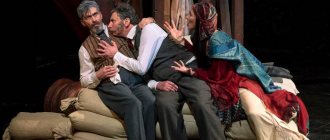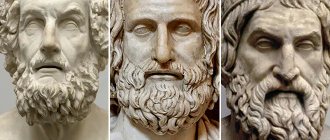About the product
The poem "Iliad" by Homer is one of the greatest works of Ancient Greece, which had a great influence on world literature. This is a classic example of an epic poem that describes the events of the Trojan War - the confrontation between the Trojans and the Achaeans.
On our website you can read online a summary of the Iliad chapter by chapter (song), and then test your knowledge using a test. A retelling of the book will be useful for the reading diary and preparation for a literature lesson in 5th grade.
The material was prepared jointly with a teacher of the highest category, Ilyina Galina Sergeevna.
Experience as a teacher of Russian language and literature - 36 years.
What is the Iliad about?
“Troy” and “Ilion” are two names of a great city located in Asia Minor, near the shores of the Dardanelles. The poem telling about the Trojan War is called the Iliad (Homer) by its second name. Among the people before her, there were only small oral songs like ballads or epics, telling about the exploits of these heroes. Homer, the blind legendary singer, composed a large poem from them and did it very skillfully: he selected only one episode and developed it in such a way that he made it a reflection of an entire heroic age. This episode is called "The Wrath of Achilles", who was the greatest Greek hero of the last generation. Homer's Iliad is mainly dedicated to him.
Other characters
- Odysseus, Ajax, Menelaus, Diomedes are brave Achaean warriors, comrades of Achilles.
- Patroclus is Achilles' best friend.
- Priam is the ruler of Troy.
- Aeneas, Paris, Dolon are brave representatives of the Trojan army.
- Helen is the wife of Menelaus, kidnapped by Paris and causing the Trojan War.
- Andromache is the wife of Hector.
- Zeus is the great god of Olympus, who promised to take revenge on the Trojans for Achilles.
- Thetis is a nymph, the mother of Achilles.
- Hera, Athena, Poseidon, Hephaestus are the gods who supported the Achaeans.
- Artemis, Apollo, Aphrodite, Ares are the gods-companions of the Trojans.
The act of King Priam
Homer continues to talk about further events (The Iliad). Their summary is as follows. King Priam comes to the winner's tent at night. And with him - a cart full of gifts. The gods themselves allowed him to pass through the Greek camp unnoticed. Priam falls to the warrior’s knees and asks him to remember his father Peleus, who is also old. Grief brings these enemies closer together: only now does the long anger in Achilles’ heart subside. He accepts Priam's gifts, gives him Hector's body and promises that he will not disturb the Trojans until they bury the body of their warrior. Priam returns to Troy with the body, and relatives cry over the murdered man. A fire is lit, the hero's remains are collected in an urn, which is lowered into the grave. A mound is built over it. Homer's poem The Iliad ends with a funeral feast.
Summary
Song 1. Pestilence. Anger
The brave Achilles is angry, and the reason for his anger was the reluctance of the Achaean leader Agamemnon to return the priest’s stolen daughter for a reward. As a result, Apollo sent a terrible pestilence to the Achaeans.
Achilles demanded that Agamemnon return the girl to her father, and he agreed, but on the condition that Achilles in return give him his beautiful concubine. The offended warrior decided to leave the Achaean leader so as not to “increase wealth and supplies here.” He complained to his mother, the nymph Thetis, about the “evil insult” inflicted on him, and she asked Zeus to punish Agamemnon.
Song 2. Dream. Trial. Boeotia, or list of ships
To keep his promise to Thetis, Zeus sent down a deceptive prophetic dream to Agamemnon, according to which he must lead the army of the Achaeans and take possession of “wide-street Troy.”
Agamemnon, believing the dream, organized a “meeting of elders.” He understood that after a ten-year war the army was weakened and the soldiers wanted to return home. Thanks to Odysseus, he managed to raise the morale of the army, which soon went to sea. The ships of the Achaeans, as well as the peoples and heroes who will oppose each other, are described in detail.
Meanwhile, in Troy, King Priam learned of the upcoming battle and advanced his own army to meet the Achaeans.
Song 3. Oaths. View of the Achaean army from the wall. Combat between Paris and Menelaus
Paris stepped forward from the Trojans and invited the bravest Achaean to “come out against him and face off in a terrible battle.” Menelaus became his opponent, and before the battle both sides agreed that the winner would take Helen and all her wealth, and the war would end.
The battle began between Paris and Menelaus - the present and former spouses of Helen. Paris was defeated, and the goddess Aphrodite saved him from certain death. Agamemnon recalled the conditions of this battle and demanded that Helen be handed over.
Song 4. Breaking oaths. Agamemnon's detour
At a council with Zeus, the gods decided that the war would continue. Zeus sent Athena to help the Trojans break the truce. The goddess managed to persuade one of the warriors to shoot “an arrow at Menelaus, the favorite of Ares.”
Agamemnon, outraged by such a daring violation of the oath, raised his army. A terrible battle began, during which many brave warriors on both sides died.
Song 5. The Labors of Diomedes
In this battle, the Achaean hero Diomedes, who was helped in every possible way by Athena, especially distinguished himself. He killed many Trojans, was wounded in the shoulder by an arrow, but thanks to Athena he was healed and again found himself in the thick of the battle. Pursuing Aeneas, Diomedes wounded the goddess Aphrodite in the hand, and then Ares. The gods went to Zeus to complain about the insolence of a mere mortal.
Canto 6. Meeting of Hector with Andromache
When “the fierce battle between the Trojans and the Achaeans was abandoned by the gods,” the preponderance of forces was on the side of the Achaeans. The soothsayer convinced Hector to command all his people to pray to the goddess Pallas Athena for help. Having accomplished this, Hector went to Paris and with reproaches forced him to return to the battlefield. He also met with his wife Andromache, who begged him to refuse to participate in the war. Hector reassured his wife and reminded that “war is the concern of every man who was born in Ilion.”
Song 7. Single combat between Hector and Ajax. Burial of the dead
Hector and Paris joined their warriors, wanting to “begin to fight and fight as soon as possible.” On the advice of the soothsayer, Hector challenged the bravest Achaean to battle. This was Ajax, who during the battle wounded Hector and then knocked him down with stones. The warriors were ready to fight to the bitter end, but the onset of night prevented this. Agamemnon threw a feast in honor of the brave Ajax.
Meanwhile, the Trojans organized a meeting where they proposed to return Helen and her wealth to the Achaeans. Paris expressed his will - to leave Helen, but return all her treasures. Priam conveyed this decision to the Achaeans, as well as a request for a temporary truce for the burial of the killed soldiers.
Song 8. Interrupted Battle
Zeus called the “immortal gods to a meeting” and forbade, under threat of terrible punishment, helping both warring parties. From the heights of Olympus he looked at the battle, and then threw lightning - a sign of the imminent defeat of the Achaeans. The Trojans, inspired by the support of Zeus, put their enemies to flight. Hera and Pallas were outraged by the injustice of the Almighty and wanted to help the Achaeans, but Zeus stopped them in time. As night fell, the battle between the Achaeans and Trojans was interrupted.
Song 9. Embassy to Achilles. Requests
After the defeat in the battle, the Achaeans “were seized with great anxiety.” In desperation, Agamemnon decided to flee. But his comrades dissuaded him from this and advised him to turn to Achilles for help. Agamemnon agreed and sent envoys to Achilles, but none of them managed to persuade him to lead the Achaean army.
Song 10. Dolonia
After a sleepless night, Agamemnon and Menelaus called all the leaders and at a general council decided to send scouts to the enemy’s camp. Diomedes and Odysseus agreed to complete the difficult task. Meanwhile, Hector also decided to send a spy to the Achaeans, and he turned out to be Dolon. Diomedes and Odysseus caught him, found out all the details of the location of the Trojan army, and then killed him. They went to Rez's camp, killed him and all his companions, and also took away "the greatest horses, the most beautiful in appearance." Odysseus and Diomedes returned to the Achaeans as real heroes.
Song 11. The exploits of Agamemnon
At sunrise, Zeus sent Enmity to the battlefield, and another battle between the Achaeans and Trojans began. The enemy forces were equal, but by noon the Achaeans managed to break the enemy ranks. Agamemnon distinguished himself with particular courage, killing many Trojan soldiers.
Song 12. Battle at the Wall
The Achaeans firmly entrenched themselves behind the wall, while the Trojans decided to split into five detachments and attack it from different sides. Once again showing himself to be a fearless warrior, Hector broke through the gate with a stone, causing the Achaeans to flee.
Song 13. Battle at the ships
In this battle, Zeus openly favored the Trojans, while Poseidon “mourned over the Achaeans.” He managed to inspire them and help repel Hector’s next attack. The advantage in the battle was now on one side or the other, and many brave warriors died.
Song 14. Deceived Zeus
Hera, who wanted to help the Achaeans, decided to “deceive the aegis-powerful Zeus.” Having seduced him with her charms, the goddess sent down a “deep and sweet sleep” to Zeus. Poseidon took advantage of this and provided significant support to the Achaeans. As a result, Hector was defeated by a stone, and he was saved from certain death by his comrades, who carried him out of the battlefield in time. The inspired Achaeans successfully repelled all the attacks of the Trojans and freed their ships.
Song 15. Back pressure from ships
Awakening from sleep, Zeus was surprised to discover the flight of the Trojans and the defeated Hector. He demanded an explanation from Hera, and then predicted the fate of the Trojan Battle if the insult from Achilles was not washed away, as he had previously promised Thetis. Zeus recalled Poseidon from the battlefield and sent Apollo as an assistant to Hector. The brave warrior again managed to push the Achaeans back to their ships.
Canto 16. Patroclia
Patroclus went to Achilles, on whose chest “hot tears flowed” about the fate of the Achaean army. Achilles took pity on him and agreed to help repel the attacks of the Trojans. Meanwhile, Ajax's forces were already running out, and the Trojans managed to approach his ship and set it on fire. At that moment, Achilles appeared with his soldiers, who put the Trojans to flight and extinguished the ship. Patroclus pursued the fleeing warriors, whom he mercilessly killed. Hector almost became his victim, but with the help of Apollo, Hector killed his opponent.
Song 17. The exploits of Menelaus
Hector wanted to take the body of Patroclus for general desecration, but Menelaus began to zealously defend him. A terrible battle broke out. Hector managed to remove Patroclus's armor, which belonged to Achilles, before the Achaeans recaptured his body. Menelaus sent a messenger to Achilles to report the death of Patroclus.
Song 18. Making weapons
Upon learning of the death of Patroclus, “a black cloud of sorrow covered” Achilles. His mother decided to console him and promised to get him a weapon made by Hephaestus himself. She went to Olympus, where she persuaded Hephaestus to forge armor and weapons for his beloved son. Meanwhile, Achilles and the other Achaeans received the body of Patroclus with all honors. The Trojans, having learned about the appearance of Achilles, decided to retreat, but Hector flatly refused to do so.
Song 19. Renunciation of anger
At dawn, Thetis brought her son “the glorious armor of Hephaestus.” Seeing him, Achilles decided to immediately rush into battle to avenge the death of Patroclus. He called the Achaeans to a meeting and publicly announced that he had forgotten his anger for the sake of righteous vengeance. Agamemnon wanted to justify himself to him and present rich gifts in honor of reconciliation, but Achilles wanted only one thing - to be in the heat of battle. When he mounted the chariot, he heard Hera’s prediction, according to which he should “perish from a powerful god and a mortal man.”
Song 20. Battle of the Gods
When the Trojans and Achaeans clashed in a terrible battle, Zeus called on the gods to take part in it and help one side or another at their own discretion. The approach of the gods to the battlefield was marked by thunder, lightning and shaking of the earth. Due to the obvious participation of the gods in the battle, the long-awaited duel between Achilles and Hector never took place, since they were protected in every possible way by their heavenly patrons - Athena and Apollo.
Song 21. Battle of the River
Achilles managed to put the Trojans to flight. He “chose twelve living young men” as a sacrifice to the murdered Patroclus. At the Xanth River, he, overwhelmed by a thirst for revenge, killed many Trojan soldiers. Priam, seeing the flight of the Trojans from a high tower, ordered the gates to be immediately opened to save them.
Song 22. Murder of Hector
All the Trojans, with the exception of Hector, managed to hide behind the saving wall. Hector's parents begged their son to come to his senses and save himself, but he intended to fight Achilles. Zeus decided to cast lots - which of the heroes would survive. Achilles was lucky, who mortally wounded Hector with a spear in battle. Wanting to humiliate the enemy as much as possible even after death, he “tied his body to a chariot and left his head to drag along.”
Song 23. Games in honor of Patroclus
Returning to the camp, Achilles paid all possible honors to Patroclus, after which he held a funeral feast. In a dream, the soul of the deceased Patroclus appeared to him, which demanded a speedy burial, since it was not accepted into the kingdom of Hades. At sunrise, Achilles completed the burial rites and organized various military and sports competitions in honor of his friend.
Song 24. Hector's ransom
Thanks to the patronage of the gods, Priam managed to persuade Achilles to return the body of Hector, whom he had killed. He brought him home, where the Trojans gave the hero the honors he deserved, his relatives mourned him, and then burned and buried his body. Then “a brilliant feast was celebrated in the great house of Priam, the ruler suckled by Zeus.”
Start of the war
The war started like this. The wedding of Peleus and Thetis, the sea goddess, took place - the last marriage concluded between mortals and gods (the same one from which the hero Achilles was born). At the feast, the goddess of discord threw a golden apple, which was intended for the “most beautiful.” Three people argued over him: Athena, Hera and Aphrodite. Paris, the Trojan prince, was ordered by Zeus to judge this dispute. Each of the goddesses promised him their gifts: Hera - to make him the king of the whole world, Athena - a sage and a hero, Aphrodite - the husband of the most beautiful of women. The hero decided to give the apple to the latter.
After this, Athena and Hera became sworn enemies of Troy. Aphrodite helped Paris to seduce Helen, the daughter of Zeus himself, who was the wife of King Menelaus, and take her to Troy. Once upon a time, the best heroes of Greece wooed her and agreed so as not to quarrel: let the girl herself choose the one she likes, and if someone else tries to fight her off, everyone else will declare war on him. Every young man hoped that he would be the chosen one. Helen's choice fell on Menelaus. Now Paris took her away from this king, and therefore all her former suitors went to war against this young man. Only the youngest of them did not woo the girl and went to war only to show his strength, valor, and win glory. This young man was Achilles.


